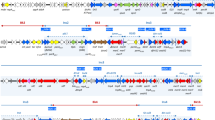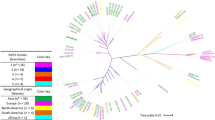Abstract
Seventy-eight bacterial isolates from human, animal, and plant hosts, representing eight species of the family Enterobacteriaceae, were screened for F-like plasmid sequences. Of the examined human Escherichia coli strains, 28% harbored one or two of the three F-like, RepFI replication regions, while 35% of the examined animal and all phytopathogenic strains harbored RepFIA-specific sequences. Comparative analysis of Salmonella, Shigella, Erwinia, and E. coli plasmid RepFI sequences showed 100% or very high homology, indicating frequent and recent interspecies gene transfer. The high incidence of RepFIA sequences in enteric bacterial species, including Klebsiella and Erwinia, showed that F-like plasmids are successful in avoiding natural barriers to establishment of horizontally transferred DNA and that in the natural environment conjugal transfer is efficient in diverse ecological niches.
Similar content being viewed by others
Author information
Authors and Affiliations
Additional information
Received: 26 March 2001 / Accepted 12 July 2001
Rights and permissions
About this article
Cite this article
Mulec, J., Starčič, M. & Žgur-Bertok, D. F-Like Plasmid Sequences in Enteric Bacteria of Diverse Origin, with Implication of Horizontal Transfer and Plasmid Host Range. Curr Microbiol 44, 231–235 (2002). https://doi.org/10.1007/s00284-001-0039-7
Issue Date:
DOI: https://doi.org/10.1007/s00284-001-0039-7




